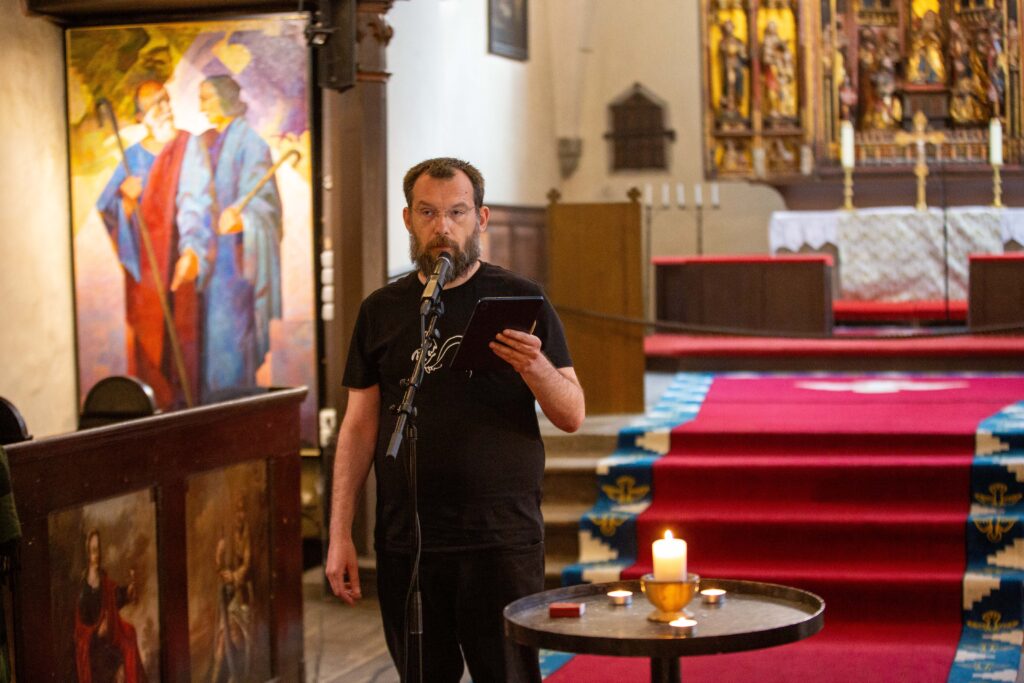Our colleagues at the literary festival HeadRead

The vibrant program of the literary festival HeadRead, taking place in Tallinn from 27 May to 2 June 2024, also hosts colleagues from the Literature Centre.
Literary pub crawl with Elle-Mari Talivee and Sirli Staub on 30 May at 18.00 in the old town
Like any proper literary festival, HeadRead offers a weekend full of rather intense mental workouts, intelligent conversations and readings – however, this intensity often involves hours of sitting. Thankfully, our programme provides a chance to stretch one’s legs and let the body do the walking. First, we have a literary pub crawl with literary scholar Elle-Mari Talivee and poet Sirli Staub. The title of the walk is taken from Mihkel Mutt’s 2005 novel of the same name, where the protagonist starts going through his favourite pubs to have a pitcher of beer in each one. Talivee and Staub are not taking you on such a rough ride, instead of drinks, you can enjoy a pint of literary history, and hear about various haunts visited by various literary characters. A thematic little glass connected to the literary works mentioned is still planned (covered by participants themselves). The age limit for the tour is 18.
Poetry mass on 1 June at 12.00 in the Church of the Holy Spirit
Translator and cultural manager Eha Vain (1954–2021) has left a deep imprint on Estonian cultural life following the restoration of independence, and one of the traditions she started at the Nordic Poetry Festival – poetry mass – is continued by the HeadRead festival. Poetry Mass is a form of poetry reading on a slightly larger scale, which allows us to bring together for a couple of hours the poetic languages and voices that we may not usually meet on a daily basis. This time, the literary congregation includes Lithuanian Eugenijus Ališanka, whose work combines modern Lithuanian life and European cultural history; Latvian Livonian Valts Ernštreits, who creates connections between Estonian and Latvian culture through Livonian culture, and Scot Robin Robertson, who strives to poeticise the restless landscapes and equally restless soul of his homeland. They will be joined by Belgian poet Philip Meersman (1971), who has visited Estonia before and writes in many languages, adding theatrical, visual and other performative elements to literary expression. The poetry mass will naturally include Estonian: Katrin Väli’s walks in a poetic forest, Kalju Kruusa’s travels to China and back, and Aare Pilv’s philosophical musings.
Eugenijus Ališanka’s, Valts Ernštreits´ and Veronika Kivisilla’s poetry evening on 1 June at 20.00 in Ait
Festival HeadRead is happy to announce a poetry event where the unique voices of the Baltic States meet. Eugenijus Ališanka (1960) is a Lithuanian poet, essayist and translator, whose poetry is characterised by a distinct ability to combine the universal and the local, weave together the landscapes of post-communist Lithuania and the literary and cultural history of Western Europe. His poetry has been compared to the work of Zbiginiew Herbert, and Ališanka himself has translated the poetry of Wisława Szymborska. Ališanka also has a special role in the literary life of Lithuania; from 1994 to 2022, he headed the international poetry festival Poetry Spring, and from 2003 to 2015, he was the editor of The Vilnius Review. Valts Ernštreits (1974) is a Livonian poet, linguist and cultural figure living in Latvia, but his professional and creative life is also strongly connected to Estonia – he has worked as a researcher on the Livonian language at the University of Tartu, where he received his PhD, and he has also compiled Latvian and Livonian dictionaries for Estonians. In 2019, he won the Ilmapuu Prize from the Council of Kindred Nations, which is in the domain of the Ministry of Education and Research. Veronika Kivisilla (1978) is an Estonian poet and prose writer whose best-known work is her gentle and humorous collection of miniatures titled Kuni armastus peale tuleb (2018), which has its origins in social media posts and takes a sensitive and poetic look at the author’s everyday life.
